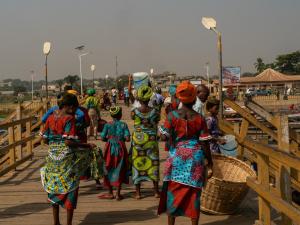Benin: promoting self-care interventions in a restrictive legal framework for abortion provision
Despite the country's considerable efforts towards reduction of maternal mortality, of the rate still remains high at 391 per 100,000 live births. The top causes of maternal deaths in Benin are hemorrhage, eclampsia, infection and abortion complications.
Contraceptive prevalence using modern methods is still low (12.4%), unmet need for Family Planning remains high (33%) and the birth rate is high among adolescents (108 ‰) with high number of cases of pregnancy in schools. This is contributed to among other factors, the limited access to SRHR information and services for young people, especially for out-of-school and poorer young people. This lack of access to SRHR information and services including family planning services contributes to thehigh rate of unsafe abortion in Benin.
In terms of availability of safe abortion care services, Article 17 of the National Reproductive Health Law of Benin permits the Voluntary Interruption of Pregnancy under the following conditions:
- when the continuation of the pregnancy endangers the life and health of the pregnant woman
- at the woman's request, when the pregnancy is the result of rape or an incestuous relationship
- when the unborn child has a particularly serious condition at the time of diagnosis
Benin has therefore developed safe abortion-related guidelines and standards and training materials in line with the national laws. The following were the steps followed by Benin to achieve
this result:
- Orientation of national experts on the WHO guidelines at a Regional Meeting in Ouagadougou in 2019 (National Society of Gynecologist/Obstetrician, Midwives, Academicians, WHO country office staff, experts from Ministry of Health, ABPF-the IPPF Member Association in Benin etc.).
- An in-country meeting conducted to disseminate and orient national stakeholders on the WHO guidelines on safe abortion (involved MoH and other stakeholders from government and non-government agencies)
- Contracting the Regional Public Health Institute (Institut Régional de Santé Publique) to review the existing national guidelines against the WHO guidelines and recommendations
- The Institut Régional de Santé Publique thereafter facilitated a process getting national stakeholder inputs for the revision of the national standards and guidelines to align with WHO recommendations
- Establishment of a group of experts composed mainly of Gynecologists/Obstetricians, experts form university teaching hospitals, the National Agency for Primary Health Care (l’Agence Nationale des Soins de Santé Primaires) to conduct thorough review of documents.
- Final validation of documents by experts and other stakeholders
Upon finalization of the National Standards and Guidelines for Safe Abortion Care, Benin has also undertook development of job aides, algorithms and health information notes to assist service providers to offer high quality services aligned to the national guidelines. Pre-service SRHR training modules for medical doctors, nurses and midwives have also been revised to incorporate these new guidelines and standards.
Technical Officer
Sexual and Reproductive Health and Rights, Benin
Email: zans [at] who.int
Tel: 00 226 70 23 64 76
Program Officer,
Health system strengthening,
WHO Benin
Email: asossou [at] who.int
Program Officer,
Family Health Program,
WHO Benin
Email: tossout [at] who.int
Program Officer,
Sexual and Reproductive Health and Rights,
WHO Benin
Email: glithof [at] who.int
Technical Officer - Communication
Sexual and Reproductive Health and Rights
Tel: +(47 241) 39571/+242 05 771 4301
Email: asekpon [at] who.int



